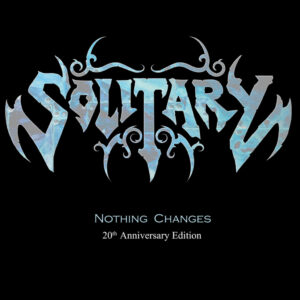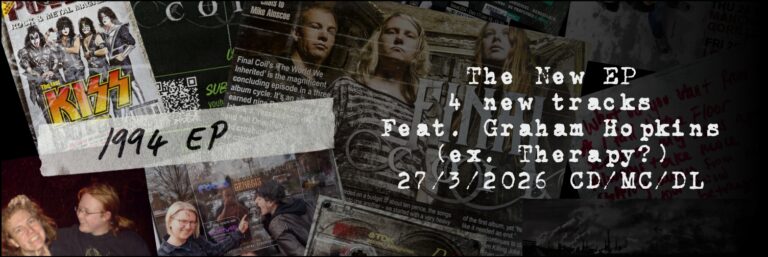The promo material reliably informs me that Nothing Changes first appeared in 1998, but if that’s the case, and this is the album’s twentieth anniversary, then that would make me… no, let’s not go there… So, Nothing Changes, Solitary’s masterful debut is back and, it seems, that some things do change because, quite aside from a touch of studio-enhancement, this revamped version also includes a slew of 1996 demos to tempt the fans back for a second bite.
Listening now, it’s difficult to think back to a time when thrash wasn’t feted, but in the mid-90s, the genre had pretty much shot its bolt. Metallica were busy exploring the load sessions in the wake of the gargantuan success of their self-titled behemoth, Megadeth were caught between Cryptic Writings and Risk and even the normally-reliable Slayer were on the cusp of releasing the patchy Diabolus in Musica, their first album of original material in four years, the previous effort having been the undisputed attitude covers collection. It was over this somewhat unpromising landscape that Solitary cast a scaly eye and, not liking what they saw none too much, they set about crafting a defiant response.
From the moment Gareth Harrop’s rumbling bass introduces Within Temptation, it’s clear that Solitary aren’t messing about. With Rich Sherrington doing his best Dave Mustaine as he hurls riffs at fellow-guitarist Matthew Costello, within temptation is a savage blast of chrome-plated riffing and snarled vocals completely at odds with the musical climate in 1998. Better still is The downward spiral, which sees the band channel their inner-Pantera to deliver a brutal groove that hits hard and fast. Simon Tomlinson keeps things interesting behind the kit and there’s a sense of purpose in the band’s furious delivery matched by few of the period save, for perhaps, the late, lamented Pulkas. The band up the ante still further on the pummeling A second chance, a track with overtones of Metallica and Machine Head underpinned by Gareth’s bowel-rupturing bass-lines. Yet, for all the aggression, the band know the value of a good chorus and A second chance has one of the best – the sort of tar-stained, whiskey-soaked monster that Corrosion of Conformity take such pleasure in doling out. An album highlight, Bitterness combines a punk-infused vocal with crushing riffs and Simon’s increasingly inventive percussion. As toms swirl around you, the rhythm section lower their heads and churn out a vital groove that was destined to ignite pits the world over and which, even after twenty years, has lost none of its vigour.
Kicking off the second half of the album, the surging title track has an early-Pantera vibe (early as in Cowboys from hell rather than Power metal, mind) with its dirty groove and fret-board-bothering solo. Next up, the short, sweet instrumental Clutching straws shows that the band aren’t only about the bludgeon, although the net effect is predominantly to make the throbbing horror of no reason hit home with all the more force for the contrast. Keeping the quality remarkably high, twisted is loaded with a vitriol that manages to intimidate even two decades down the line before the album comes to a juddering halt with fear, one last blistering statement from a band refusing to bow to the trends of the time. With elements of Testament in its call-and-response vocals and suitably acerbic guitar work, fear is exactly the conclusion the album needed.
So far, so good… so what? If you’ve already got the album, the studio tinkering is unlikely to get you back on board and you already know how damn good the record is. However, this special CD edition (no downloads – ha) also features a selection of album demos from 1996 to tempt fans to part with their hard-earned cash (strangely, the three bonus tracks from the 2004 edition are omitted). Listening to the tracks directly after the album, they sound tinny as hell, as if they were recorded in Darkthrone’s shed, although if you leave a suitable pause before putting them on, they sound much more potent… such is the power of perception. First up is a second chance, a surprisingly complete rendition that strangely recalls Kill II This. It’s an impressive demo (especially considering the technological limitations of the mid-90s) and it showcases just how much Solitary got right pretty much from the start. Next up is the bottom line, one of two tracks that were demoed, but which did not make the final, nine-track album. A solid track rather than an exceptional one, it’s easy to see why it didn’t make the grade despite an impressive performance from all concerned. Similarly what price is an oddity that sees the band dig into Draconian Times-era Paradise Lost with a doomy, metal-ballad that lacks the punch found elsewhere. As a curiosity, it’s a fine bonus and it’s all the more interesting for the fact that it didn’t make the final cut. Strangely, No reason actually sounds better in its demo incarnation, the tinnier sound adding to the atmosphere of the piece, although fear definitely benefits from the deeper, darker production job that the final album affords it. All in all it makes for a pretty effective grab bag of extras, although (as always) I’d prefer to have the bonus material on a separate CD rather than tacked on to the end of the original album.
So, should you buy this new version of Nothing changes? For those who already own a copy, it’s a tough call, although the demos are undoubtedly interesting, and it really does come down to how much of a fan you are. However, if you don’t have a copy, then this is very much the definitive version of an album that has attained classic status in the intervening years and therefore an essential addition to your collection. One of the few bands flying the flag for thrash at a difficult time in the genre’s storied history, Solitary’s status is assured and nothing changes remains a fine debut. 8




